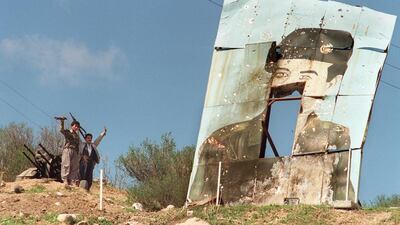Sorry, but I can't agree with Faisal Al Yafai's conclusions in What if the US had not invaded Iraq in 1991 (August 4).
The article assumes the 1991 invasion was the only way to drive Saddam out. This is false.
The UN imposed sanctions before the invasion just after Kuwait was occupied and Saddam offered to withdraw if the sanctions were lifted.
This article assumes that the sanctions would not exist if there was no invasion, but they came before the invasion.
Mohannad Alchalabi, Dubai
Without intervention, would Saddam Hussein have stopped at Kuwait's borders or would he have kept going? There was certainly some fear at the time. Dave Pryce, Abu Dhabi
Airlines should make changes
It will take more than the discovery of debris before we know why the Malaysian Airlines plane crashed (Are there any lessons to gain from MH370?, August 3).
Until they find the voice recorder and flight data recorder we can only speculate.
However, a number of recommendations were made when the incident occurred and I'm wondering how many of them have been implemented.
I believe this is the real question that is not being answered. For example, the engine manufacturers can receive data on a real-time basis, but how many airline companies have acquired this application?
Randall Mohammed, Dubai
Uncertainty may affect property
There may be other reasons for the current real-estate situation in Dubai (Falling prices don't mean property market maturity, August 3).
The falling market could also mean a decline in investor confidence due to the political situation in some neighbouring countries.
It could also be a result of restricted lending due to the introduction of the new credit bureau.
Iftikhar Gader, Dubai
Medical care should be free
More Dubai employees now have health cover (August 2) is welcome news.
I think the UAE should follow the health care system in the UK. All treatment should be free regardless of the patient's nationality.
Mohd Nawas, Abu Dhabi
Insurance of any type is fantastic – until you need to make a claim. That's when you realise your policy isn't as good as the salesman made it sound.
Many insurance companies go the extra mile not to have to pay out. Justin Webb, Dubai
Children need open spaces
In reference to Parents see red over play ban on green areas in Mudon (August 2), I think children are losing by not having space in which to play.
All children need to be able to run around, hit a ball, discover nature, climb a tree, play marbles in the sand and simply have the chance to be young.
Let them play on the grass and be free spirits while they can, because youth disappears so quickly.
Name withheld by request
Children don't have the space to play because too many are now living in apartment buildings. Many countries have this problem, including mine.
K Ragavan, India
Friendly gesture ends film rivalry
I know the simple answer to the question posed in Clash of the titans: why Salman Khan gave up his Eid slot to Shah Rukh Khan (August 3).
It was a goodwill gesture, as they are now friends.
Arif Hassan, India
Cars don't need to go on holiday
Taking your car to a foreign place makes little sense to me (Take your car to London, but show some sense, too, August 4).
Seeing young Arabs driving flashy cars certainly gives people the wrong impression of the Gulf.
These super cars speak for themselves when they are on the road, no matter where in the world. The drivers don't have to participate in competitions or parades to seek attention.
Fatima Suhail, Sharjah
I would show off too, if I could. I love these cars.
Melanie Neadeau, US

